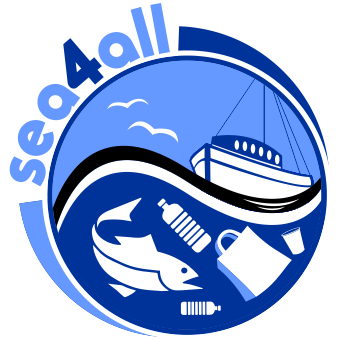Rationale
The marine and coastal environment is indisputably a valuable part of our planet, which is in serious danger nowadays, although it constitutes the fundamental pillar for many aspects of human activities, such as marine traffic and fisheries, offshore oil exploitation, urbanization, tourism, etc. Nevertheless, the seas have suffered from mankind for millennia. Nowadays, it is even worse, the seas are threatened by various kinds of pollution, caused from peoples’ activities on land and from technological disasters (oil spills,plastics,chemicals, etc.) both onshore and offshore. The environmental damage is enormous, impacting sea life and consequently humans’ health. It is a matter that concerns and affects everybody, all ages and all humans. Unfortunately as it has been proved, only a strong environmental consciousness can make the change. And this is a matter of culture and education that can be cultivated from small ages to be build up on later on.
At the same time, ICT innovation is reshaping every aspect of our life (professional, social, educational, personal etc.), and so far has shown a great potential in affecting and improving it. In this sense, one aspect of our lives that is greatly affected is the development of virtual learning environments, which are considered to have a high degree of interactivity and complexity; not only due to the need of specialized and appropriate ICT learning environments but also due to the need of innovative didactical methods and learning material in order to maximize the effectiveness and efficiency of ICT available resources, as the educational activities must be comprehensive, aiming to meet the needs of tomorrow. Needless to say that contemporary students/young people are nowadays an on-line population with various web possibility accesses like computers and mobile devices.
Aim of this proposal is to contribute significantly to the formation of a strong environmental awareness and consciousness in students of school age and in the educational community such as teachers, educators, in a playful manner and assisted by innovative pedagogical ICT tools. Acquisition of skills and competences will be promoted by fostering critical thinking in environmental issues regarding also present and future preventive and responsive behaviors. To this end learning material on oil spill and floating object scenarios will be developed, including animations, collections of maps and photos, videos, etc. as well as tools such a multilevel game-based learning (a Serious Game) and an e-learning platform giving the opportunity of transferring an integrated education in marine pollution issues by school teachers and educators, supported by the ICTs and new technologies in school education and training. The use of ICT tools shall encourage, in a playful manner, the motivation and the mental training in the field of marine pollution.
Sea4All project aims to help building a stronger environmental consciousness to students in school age and to the school teachers and educators through the creation of innovative resources and practices for training in marine pollution with special emphasis on oil spills and floating objects (e.g. plastics) by making effective use of the innovative and state of the art ICT technologies in education. During the project, innovative learning material and tools will be developed in order to transfer and spread the knowledge to the target groups. The appropriate learning strategy will be elaborated in collaboration with the teachers equipping them with innovative approaches and ICT methods as a driver to transfer the relative knowledge to the schools.
As part of the innovative pedagogical methodologies, the project will apply (i) Teaching Practices: The project specifically targets the introduction and nurturing of transversal soft skills through exploratory learning and creative activities. In this context, training and knowledge, as well as multifaceted content and tools are created for the teachers so that they can address multiple learning styles and intelligences and facilitate learning that takes into account the interests, goals and preferences of their students and increases their self-motivation ii) Learning Practices: The foreseen activities and electronic tools support free experimentation, creation of innovative content and artifacts through creative thinking and practices, and playful game-based learning. The activities, as well as the tools content and interface will be adaptable so that they can best serve individual learners’ needs, while learners will be able to direct and regulate their learning process. Particular emphasis will be given to the integration of communication and collaboration capabilities allowing learners to support and interact with each other.
The project shall apply all the approaches and developments to empower and foster critical thinking of learners in environmental context (marine environment) and to offer present and future preventive and responsive behaviors.
